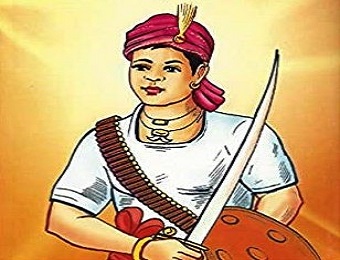People and Personalities of Gadchiroli District
People and Personalities of Gadchiroli District
The big stories often make the headlines of our historical narratives, but history is not only about the landmark events - it finds shape and character in the myriad events that led up to a flashpoint of change. An attempt to discover and document stories of people, events, and places linked to the freedom struggle of India at the micro level of the district has led to the creation of a Digital District Repository. Stories in this section can be broadly classified under - People & Personalities
Baburao Shedmake
 Baburao Shedmake, a tribal hero of the 1857 War of Independence was born in 12 March 1833 at Gadchiroli district and died at a young age of 25 on 21 October 1858. He made significant contribution in the War of Independence of 1857.
Baburao Shedmake, a tribal hero of the 1857 War of Independence was born in 12 March 1833 at Gadchiroli district and died at a young age of 25 on 21 October 1858. He made significant contribution in the War of Independence of 1857.
The sacrifice of Shaheed Baburao Shedmake is very important in the history of freedom struggle of Gadchiroli district. His mother's name was Jurja Kunwar and his father's name was Pulaisur Bapu. Baburao was trained in wrestling, tirakamatha, (bow and arrow), sword and spear at the age of 3 in Gotul. He used to go for hunting as well as to study weapons in the forest with his companions. After completing his primary education from British English Central School, Raipur (Madhya Pradesh - now Chhattisgarh) upto Class IV, he returned to his village.
He was informed of the persecution by the British after his arrival which further enhanced his understanding. Despite belonging to the dynasty, he did not have landed property but had a sense of appreciation for a society that had matured over time. He was married to the princess of Madavi dynasty in Adilabad district of Andhra Pradesh.
At that time the district and its environs had a large number of Gond, Pardhan, Halbi, Nagchi and Madia tribes. On 18 December 1854, R.S. Ellis was appointed Collector, and the British began to oppress the poor. Common masses were not happy with the missionaries. At that time, Gadchiroli area was full of vegetation, mineral wealth and the British needed these properties to run their property, so the tribal lands were forcibly occupied by the British. Baburao did not like this at all.
Tribals have a right to land and they should get it, he felt. He believed that tribals should live their lives and live a cultural life, not lose their true identity through conversion. Such things ignited the flames of rebellion in his mind and he was determined to save his people by fighting the British till death. On 24 September 1857, he formed the 'Movable Army' to carry out this revolution.
He trained an army of 500 adivasis and Rohils from Adapalli, Mollampalli, Ghot and adjoining areas. He declared war on the British. To teach the British a lesson, they chose Rajgad pargana adjacent to Gadchiroli, which was under the control of the British, the responsibility of which was handed over to Ramshah Gedam by the British.
On 7 March 1858, Baburao along with his allies attacked Rajgad and captured the whole of Rajgad. On 13 March 1858, Captain Crichton sent troops to recapture Rajgad and capture Baburao. This time too Baburao Shedmake won the battle. On 29 April 1858, Baburao attacked the English camp at Chichgudi of Aheri zamindari. Telegram operators Gartl and Hall were killed and several British soldiers were wounded. One of his companions, Peter managed to escape and was taken to Captain Krakton.
Baburao's movement overcame many obstacles. The British confiscated land belonging to him and his accomplices. Venkatrao hid in the forest, the movable army broke up and Baburao fell alone. After the defeat of Ghot, the British put more pressure on Rani Lakshmibai. As soon as Lakshmibai heard the news that Baburao had fallen, she sent Rohilon troops to Bhopalnatham to capture Baburao. Baburao stayed there for a few days. At that time Baburao did not oppose him but Rohila caught him at night and explained the purpose of his work. Seeing the right time, he secretly left. Upon hearing the news that Baburao had fled the army, Captain got angry. Baburao came to Aheri.
When Rani Lakshmibai heard this, she invited Baburao to her house for dinner. He accepted the invitation and reached Lakshmibai's house, Lakshmibai informed the British. While eating, the British surrounded Lakshmibai's house and took Baburao as a prisoner. Baburao and his accomplices were tried in the Court of Crichton for the murder of Garteld and Hall by the British and for revolting against the British government. In his verdict, he gave the punishment of hanging Baburao and sentenced his accomplices to 14 years in prison. On 21October 1858, Baburao was sentenced to death. At 4 pm on the 21st, he was hanged on a peepal tree in Gadchiroli castle which was converted into a prison.
Thus, at the age of 25, Baburao Shedmake showed his prowess and sacrificed for freedom. For his bravery and courage, the Government of India issued a stamp on his birthday on 12 March 2007. Every year on the day of Veer Baburao Shedmake's sacrifice, thousands of tribals gather near the Peepal tree in Gadchiroli jail to pay their respects.
Source :
- Muruganantham, IAS 2020 (Maharashtra)
- Azadi Ka Amrit Mahotsav
Last Modified : 9/6/2023
This topic Provides information about Personalitie...
Provides information related to People and Person...
This topic provides information about People and P...
Provides information related to People and Persona...
